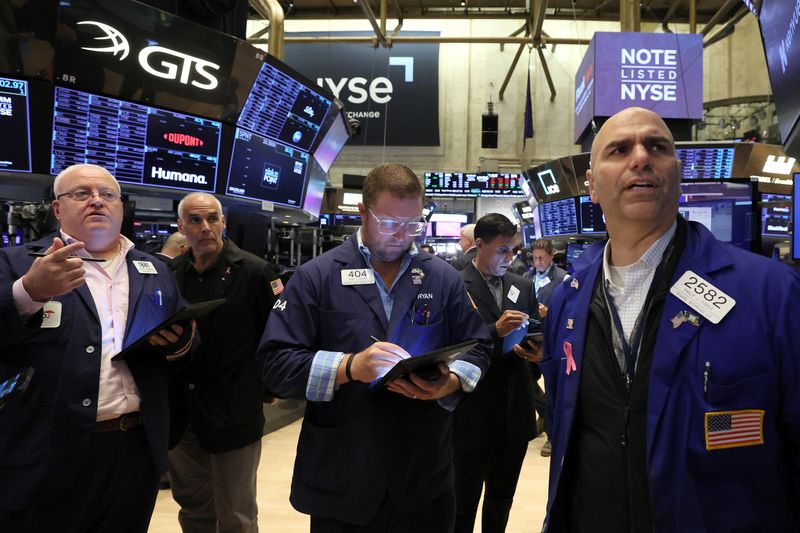LONDON (Reuters) -Geopolitics are at the forefront of everyone's minds after war broke out between Israel and Palestinian militant group Hamas, and the mood in markets is jittery at best.
This week might offer some reassurance that both households and businesses are holding up in an uncertain macro environment as some of the world's biggest companies report earnings, and economic data offers a look at growth, wages and consumer spending in the likes of the Unites States, China and Britain.
Here's your week ahead in markets from Kevin Buckland in Tokyo, Lewis Krauskopf in New York, and Naomi Rovnick, Karin Strohecker and Amanda Cooper in London.
1/ EARNINGS HEAT UP
A number of major U.S. companies report results, revving up a third-quarter earnings season expected to show a pickup in profit growth after a tepid first half.
Tesla (NASDAQ:TSLA) kicks off earnings for the megacaps on Oct. 18. These companies' shares have been key drivers of the equity rally in 2023.
Bank of America (NYSE:BAC) and Goldman Sachs (NYSE:GS) both report Oct. 17. Other heavy hitters include healthcare giant Johnson & Johnson (NYSE:JNJ) on Oct. 17, Netflix (NASDAQ:NFLX) on Oct. 18 and Philip Morris International (NYSE:PM) on Oct. 19
In economic data, U.S. retail sales for September, due on Tuesday, will provide a key look into the health of the consumer. Investors are keen to determine if the economy can avoid a hard landing. U.S. retail sales increased more than expected in August as a surge in gasoline prices boosted receipts at service stations.
2/ CASTLES OF SAND The clock is ticking loudly for China's biggest private property developer. Country Garden has until Tuesday to meet coupon payments or have all its nearly $11 billion in offshore debt deemed in default. It's not alone. Companies accounting for 40% of Chinese home sales have defaulted since 2021, when a liquidity crisis hit the sector, which accounts for about a quarter of the economy. Beijing has rolled out a raft of measures recently, but with little impact on home sales. There have been reports the government is looking to increase its budget deficit to meet this year's 5% growth target. Recent data already suggests the worst may be over for parts of the economy. Wednesday could bring confirmation, with the release of GDP, industrial output and retail sales figures.
3/ POLES TO THE POLLS
Poles voted for a new government in a high-stakes election on Sunday, following a tight, unpredictable race in central Europe's largest economy. The cost of living and migration are key domestic issues, but the vote will shape Poland's - currently frayed - ties with Brussels, and also be hugely consequential for European elections in summer 2024.
Ruling nationalist Law and Justice party (PiS) was ahead in the election, but looked likely to fall short of a majority, according to a late exit poll on Monday. The risk is such an outcome could lead to fragile government, or even a political vacuum, which could bring more pain for the zloty, domestic bonds and the country's stock markets.
On Sunday, business heir Daniel Noboa won Ecuador's presidential election with more than 52% of the vote, while Argentinians head to the polls on Oct. 22.
4/ BANK ON SOME OPTIMISM
Storm clouds are brewing over European banking stocks as the boost from higher interest rates fades and recession risks rise, but some big investors are hanging on to shares.
Banks have long underperformed the region's main stock market. And just ahead of quarterly earnings next week, European bank shares are sporting a dividend yield of almost 8%, making them cheaper on this basis than during the 2008 global financial crisis.
Banks have had a major boost from hiking their loan costs in line with central bank rates.
Analyst forecasts collated by European asset manager Amundi show European banks are expected to grow adjusted earnings by 25% this year, followed by a 6% gain in 2024.
5/ THE OLD LADY'S DILEMMA
Poor Old Lady of Threadneedle Street. The Bank of England (BoE) has been constantly wrongfooted by inflation data for months. For most of the year, it's come in above expectations and well above the central bank's own forecasts. Suddenly in August, it slowed more than expected. Many believe the data pushed the BoE to leave rates unchanged at its last meeting.

That said, inflation is still over three times the BoE's 2% target and growth isn't exactly stellar. Meanwhile, at the last count, the labour market was starting to cool, but basic pay grew at its fastest rate on record - making the BoE's juggling act even tougher.
More surprises on Oct. 17 and 18, when employment and inflation data land, respectively, could set an awkward scene for the BoE's November meeting a little over two weeks later.